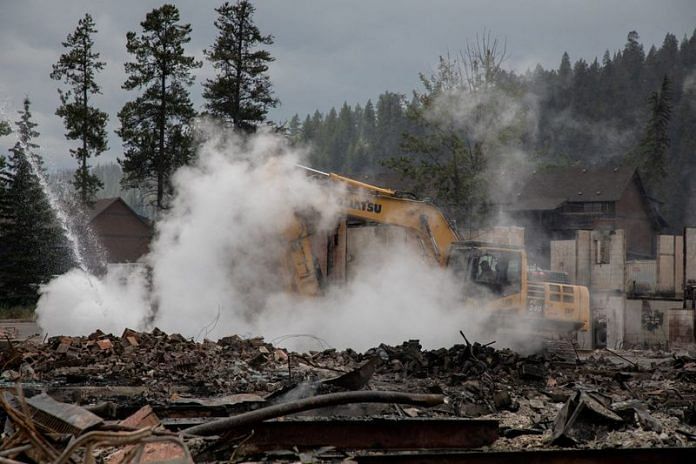By Nivedita Balu
TORONTO (Reuters) – Hotter summers in Canada that have sparked wildfires in tourist areas, intense hailstorms and thunderstorms with severe flooding in major cities, all likely linked to climate change, are leading to personnel shortages and potentially claims adjustment delays, according to insurance sector insiders.
The industry depends on teams of insurance adjusters to look into claims and determine the amount of loss, or damages covered by insurance policies. They are a vital cog in a business being stretched thin by mounting claims from homeowners and businesses.
Insurance claims are rising globally as climate change spurs more severe weather, but Canada is particularly at risk as one of the world’s most vast and forested lands. Many adjusters are retiring and certifications are different in each province, making it challenging for Canada to handle increased claims, companies, consumers and industry groups told Reuters.
“These events have placed immense pressure on insurance adjusters, who are critical following natural catastrophes, as they ensure the industry can support consumers as quickly as possible,” Insurance Bureau of Canada, an industry group, said.
In August, insurance adjusters toured Jasper by bus after firefighters had battled a blaze that damaged or destroyed a third of the mountain community, making it the second most expensive wildfire in the province of Alberta’s history by insured losses.
The fire surpassed C$880 million ($653.55 million) in insured damages, according to initial estimates from Catastrophe Indices and Quantification, the Insurance Bureau of Canada said.
Globally, many insurers have coped with unexpected claims in recent years, mainly by raising premiums and excluding some businesses.
But Intact Financial, Canada’s biggest property and casualty insurer, estimates about 250 policy holders had damage in Jasper and it expects losses within its annual range of C$900 million for all catastrophic events. The company insures about 700 families and businesses in the Jasper area.
The insurance division of TD, Canada’s second largest bank, said weather events in August, including Calgary hailstorms and Montreal floods, would lead to claims and related costs of more than C$300 million in the fourth quarter, after it recorded claims costs of C$186 million due to floods in Toronto and Alberta wildfires in July.
Last year, wildfires burned 18.5 million hectares (45.7 million acres) of land, more than double than the previous record set two decades ago, turning European and American skies orange and the air grey.
Over the last 10 years, the number of Canadian claims tied to extreme weather events has risen to more than 1.3 million, up 93% from a decade ago, according to the IBC.
“I remember when I would only get one catastrophic event a year… now we’re looking at a dozen of them a year,” said Anita Paulic, director of operations and catastrophe response at ClaimsPro, an independent claims management firm.
Paulic, whose firm services insurers by sending out teams of claims adjusters, said that in the last few weeks she has had to redeploy personnel to handle flood claims in Toronto, hail damage claims in Calgary, and those related to the wildfire.
Insured losses from natural disasters averaged C$2.2 billion ($1.63 billion) a year over the last decade, far exceeding the previous decade’s average of C$632 million, according to the IBC, which expects escalating losses to continue.
Adjusters are often playing referee between the consumer and the insurers, and the increase in volume has slowed claim settlements, especially as access to certain areas following catastrophes is restricted.
Kyler Hart-Moore, executive general adjuster at Alberta-based Laurin Adjusters, said file loads have doubled during the catastrophic seasons for some in the industry.
“You’re just getting a grip on one event and getting those files under control, and the other event hits right on its tail,” he said.
He called the work a “drop your fork service.”
“No matter what part of dinner you’re in, if someone calls you get up and you go.”
PEAK CLAIM SEASON
In Jasper, industry experts say claim settlements could take between four weeks to six months depending on the damage while adjusters also address the other weather-related disasters.
There have been over 4,800 wildfires in Canada this year, the world’s third most-forested nation. The blazes have forced thousands of people to evacuate their homes and also disrupted oil and mining operations in remote regions.
For insurance adjusters, this means work in their peak claim season between June and August has intensified dramatically.
The increase comes as many Canadian claims adjusters are retiring, industry sources said. Independent adjusters are licensed provincially, an additional challenge when they need to relocate to assess damages in different parts of the country.
Many companies are already looking to the next generation of adjusters as increased work flow and claims will require at least 10% to 20% more adjusters in the next five years, industry experts say.
Some companies including ClaimsPro are looking at college job fairs to recruit younger professionals more open to travelling.
But the job, which requires working with people still reeling from losing a home and treasured belongings or seeing livelihoods destroyed, isn’t for everyone.
“The degree of empathy without sliding into sympathy, it’s very key and it’s difficult,” said Hart-Moore.
($1 = 1.3465 Canadian dollars)
(Reporting by Nivedita Balu in Toronto and Nia Williams in British Columbia; Editing by Caroline Stauffer and Bill Berkrot)
Disclaimer: This report is auto generated from the Reuters news service. ThePrint holds no responsibilty for its content.



